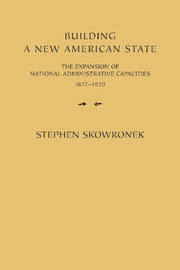Book contents
- Frontmatter
- Contents
- Preface
- Part I The state-building problem in American political development
- Part II State building as patchwork, 1877–1900
- Introduction: The triumph of the state of courts and parties
- 3 Patching civil administration: the limits of reform in the party state
- 4 Patching the army: the limits of provincial virtue
- 5 Patching business regulation: the failure of administered capitalism
- Part III State building as reconstitution, 1900–1920
- Epilogue: Beyond the state of courts and parties – American government in the twentieth century
- Notes
- Selected bibliography
- Index
4 - Patching the army: the limits of provincial virtue
Published online by Cambridge University Press: 03 May 2010
- Frontmatter
- Contents
- Preface
- Part I The state-building problem in American political development
- Part II State building as patchwork, 1877–1900
- Introduction: The triumph of the state of courts and parties
- 3 Patching civil administration: the limits of reform in the party state
- 4 Patching the army: the limits of provincial virtue
- 5 Patching business regulation: the failure of administered capitalism
- Part III State building as reconstitution, 1900–1920
- Epilogue: Beyond the state of courts and parties – American government in the twentieth century
- Notes
- Selected bibliography
- Index
Summary
Of late no argument has been used more effectively to prevent military legislation than the assertion that the principles of military organization abroad are designed to support monarchies, and that, if not dangerous, they are at least incompatible with free institutions. No delusion could be greater. The student of modern history cannot fail to discover that the principles of organization, like those of strategy, are of universal application, and that no nation has ever violated them, except at its peril.
Emory Upton, The Military Policy of the United States 1881A professional army stands next to a professional civil service as an institutional standard of the modern state. In the late nineteenth century, the Prussian army emerged as the undisputed model of military professionalism. With lightning-fast victories over Denmark, Austria, and France, the Prussians redefined the concept of warfare. The key to their success was a mass citizen army that was rigorously trained in peacetime, readied for immediate mobilization, and commanded by a highly educated and centrally coordinated cadre of staff and line officers. This form of military organization made possible short, decisive wars, and it put a premium on long-term peacetime preparation, comprehensive planning, and professional leadership.
By the 1880s, the basic principles of the Landwehr had been adapted to indigenous military traditions in France, Russia, Austria, Italy, and the minor continental states. The Prussian model was also the standard for professional army reformers in Great Britain and America, but in terms of actual structural changes, these more isolated states lagged behind those of the Continent.
Information
- Type
- Chapter
- Information
- Building a New American StateThe Expansion of National Administrative Capacities, 1877–1920, pp. 85 - 120Publisher: Cambridge University PressPrint publication year: 1982
Accessibility standard: Unknown
- 1
- Cited by
